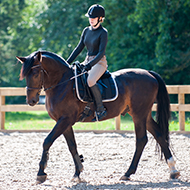
The five year road map focuses on the guardianship of horses.
British Equestrian (BEF) has unveiled an ambitious five-year strategy to support the future growth and success of the UK’s equestrian sector.
Shaped by the BEF Board and executive, with input from staff and member bodies, the document is a road map to ‘unite, inspiring and grow’ Great Britain’s equestrian sector ‘for the benefit of everyone who contact with horses’.
The five year strategy focuses on the guardianship of horses, outlining four key strategic principles. Throughout these principles are ‘golden threads’ to strengthen every decision, consideration and action, with the fundamental values of excellence, respect, integrity transparency, inclusivity and courage.
BEF chair Fields Wicker-Miurin OBE FKC commented on the challenges faced by the equestrian community over the last four years, such as Brexit, the pandemic, the cost of living crisis and the wider public questions surrounding horse welfare.
He said: “We recognise these challenges and the need to face them squarely to protect the future for our sport and the horses we love. We have spent a lot of time listening, and our strategy reflects what we have heard from a range of different voices in the equestrian world.
“In my six months as chair, I’ve seen first-hand how the love for the horse, whether from a happy hacker or an Olympic medalist, brings us all together. We are all focused on building a sustainable future with the horse at the forefront of everything we do.
"We have a great foundation to build from with every one of Britain’s athletes returning home from the Paris 2024 Olympic and Paralympic Games with at least one medal, and there is so much more to come.
“We look forward to working with our member bodies and more widely across the equestrian sector to deliver our strategy and demonstrate the value and positive social impact of our sector to the wider world.”
British Equestrian’s key strategic priorities for the next five years are:
- to enable and support a vibrant and healthy equestrian sector
- to represent and advocate for the needs of our member bodies and sector at the highest level, both nationally and internationally
- to be a leading equestrian nation
- to support sustainable growth at all levels, ensuring a thriving, accessible, diverse and inclusive sport.
Chief executive Jim Eyre said: “We are a proud and successful equestrian nation, and with that comes a huge responsibility to ensure the sport can continue to grow and develop. Despite the wide-ranging benefits of our sport, the sector is faced with numerous challenges, which we collectively must address and navigate.
“With the oversight of our Board of Directors, the British Equestrian team, our member bodies and key equestrian and sporting stakeholders, and underpinned by a robust operational plan, we can deliver this operational strategy to ensure Britain remains at the forefront of the sport, and that the sector continues to thrive into the future.”
Image (C) Shutterstock.



 FIVP has shared a survey, inviting those working in independent practice to share their views on the CMA's proposed remedies.
FIVP has shared a survey, inviting those working in independent practice to share their views on the CMA's proposed remedies.